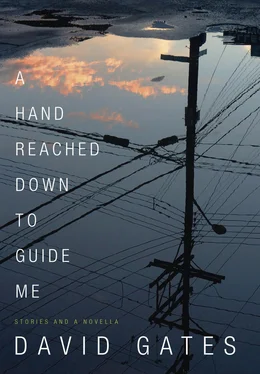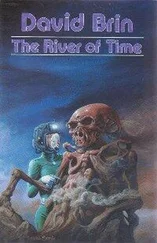David Gates - A Hand Reached Down to Guide Me
Здесь есть возможность читать онлайн «David Gates - A Hand Reached Down to Guide Me» весь текст электронной книги совершенно бесплатно (целиком полную версию без сокращений). В некоторых случаях можно слушать аудио, скачать через торрент в формате fb2 и присутствует краткое содержание. Жанр: Современная проза, на английском языке. Описание произведения, (предисловие) а так же отзывы посетителей доступны на портале библиотеки ЛибКат.
- Название:A Hand Reached Down to Guide Me
- Автор:
- Жанр:
- Год:неизвестен
- ISBN:нет данных
- Рейтинг книги:5 / 5. Голосов: 1
-
Избранное:Добавить в избранное
- Отзывы:
-
Ваша оценка:
- 100
- 1
- 2
- 3
- 4
- 5
A Hand Reached Down to Guide Me: краткое содержание, описание и аннотация
Предлагаем к чтению аннотацию, описание, краткое содержание или предисловие (зависит от того, что написал сам автор книги «A Hand Reached Down to Guide Me»). Если вы не нашли необходимую информацию о книге — напишите в комментариях, мы постараемся отыскать её.
magazine anointed “a true heir to both Raymond Carver and John Cheever.”
A Hand Reached Down to Guide Me Relentlessly inventive, alternately hilarious and tragic, always moving, this book proves yet again that Gates is one of our most talented, witty and emotionally intelligent writers.
A Hand Reached Down to Guide Me — читать онлайн бесплатно полную книгу (весь текст) целиком
Ниже представлен текст книги, разбитый по страницам. Система сохранения места последней прочитанной страницы, позволяет с удобством читать онлайн бесплатно книгу «A Hand Reached Down to Guide Me», без необходимости каждый раз заново искать на чём Вы остановились. Поставьте закладку, и сможете в любой момент перейти на страницу, на которой закончили чтение.
Интервал:
Закладка:
Just as canker was a disease of plants and cancer one of animals, so methamphetamine was—well, something like “a vice of the lower classes,” but Paige couldn’t get the phrase to turn. She’d gone out to the car, supposedly to get her CDs, but in fact to sit in the passenger seat and have her really very modest two or three little hits of pot, which she might as well make half a dozen tonight. And good pot too, what Sally called “better living through hydroponics.” But wouldn’t her father smell it on her clothes? No, because she’d hung the hand holding the pipe out the car window and breathed the smoke out there too, into earth’s atmosphere. True, someone else might have happened by and smelled her at it. But the atmosphere was so vast. It was like, parts per million.
“Why on earth would you be reading Variety ?” her father said. Nicole Kidman was pretending to be stoned by looking sleepy and speaking slowly.
Paige had to spit her ice cube into her palm to answer. “What are you talking about?” Cold. This was why they called them ice cubes.
“You said you’d seen something in Variety .”
“I did?”
“Well, I’m not imagining this. I hope.”
She dropped the ice cube back into her glass and wiped her palm on the weirdly smooth synthetic blanket that wetness didn’t seem to penetrate. “Oh. Oh oh oh. Sally? My friend Sally? She sold her book to the movies, and she emailed everybody this thing about it in Variety , and it had all these words like ‘prexy.’ Prexy. I mean, it’s hilarious, right?”
“Ah. See, I was imagining something quite different.” He poured more gin, and Paige heard his ice cubes snap, even with Nicole Kidman going on and on. This was the worst performance, bar none, she had ever seen, unless it was pretty good.
“Like what were you imagining?”
He coughed. “I had this nightmare vision of you turning into one of these pop-culture—whatever they call them. Cultural media studies.”
“I don’t think I’m turning into anything,” she said. “I’m just watching this, you know?”
“I’m sorry, kitten. And I interrupted. Why don’t we—Well, I guess we can’t wind it back.” He meant the movie.
Eyes Wide Shut might ordinarily have been depressing, since it was about sex. But the jeweled mask on the pillow: that was so genius. It was totally totally Richard. Though let’s be fair: totally totally her too. A suspicion made itself known in the upper left front of her mind that if she wasn’t high she would think it was heavy-handed.
When she saw her father had fallen asleep, with the plastic glass of ice cubes on his—whatever you called it between chest and stomach—she reached for the remote and sneaked the volume down, got up and turned off his light, then lifted the glass away.
The phone rang. As Paige brought it to her chin, she had time to see her father raise his head, time to hear him say “What’s—” and time to understand that it must be Abigail.
“Hello?” She said it deeper and softer than her real voice, her tongue up and back to roll the l s.
“Who is this?” Abigail said.
“Well, who is this? ” Paige said, in the same happy-birthday-Mr.-President voice.
“Who is it?” her father said.
“They hung up,” Paige said.
On the screen, people were silently interrogating silent Tom Hanks. Tom Cruise, rather.
The phone rang again. Paige picked it up and said, in the same voice, “Hello?”
“Who the hell keeps calling ?” Her father coughed and rolled on his side, his back to her.
She pinched the little tab on the phone plug and pulled out the cord, the last thing linking them to earth, and snapped off the remote. Let him sleep. She would be their sentinel tonight, her eyes drilling into the dark.
A Hand Reached Down to Guide Me

The name Paul Thompson won’t mean any more to you than mine would, but if you’d been around the bluegrass scene in New York some thirty years ago, you would’ve heard the stories. Jimmy Martin had wanted to make him a Sunny Mountain Boy, but he’d refused to cut his hair. He’d turned Kenny Baker on to pot at Bean Blossom and played a show with Tony Trischka while tripping on acid. Easy to believe such bullshit back then. The first time I actually saw him he was onstage, wearing a full-length plaster cast on his—give me a second to visualize this—on his left leg, a crutch in each armpit, playing mandolin with only his forearms moving; someone had Magic-Markered the bottom of the cast to look like an elephantine tooled-leather cowboy boot. This was at an outdoor contest in Roxbury, Connecticut, in 1977, the summer I turned eighteen. The band I’d come with had finished its two numbers, and we were behind the stage putting instruments back in cases when Paul kicked off “Rawhide.” I heard our mandolin player say, “Okay, we’re fucked.”
His band—older longhairs, except the fiddle player, a scary guy with a Marine buzz cut—won first prize, as they had the year before. But we placed second, and he lurched over to me on his crutches and said he’d liked how I’d sung “Over in the Gloryland.” It was Paul Thompson saying this. I suppose I was a good singer for a kid just out of high school; I thought of Christian songs simply as genre pieces in those days, but I had the accent down. I said, “Thanks, man,” and refrained from embarrassing myself by complimenting him back. We ended up singing a few songs together out by the cars—I remember him braced up against somebody’s fender—and I think it surprised him that I knew so much Louvin Brothers stuff: “Too Late,” “Here Today and Gone Tomorrow,” “Are You Afraid to Die?” I let him sing Ira’s tenor parts; now that he’d stopped smoking, he said, he could get up there in the real keys. He was taller than me, and his cheekbones made him look like a hard-luck refugee in a Dust Bowl photograph; he had white hairs in his sideburns, though he must only have been in his thirties. He told me he’d broken the leg playing squash; naturally, I thought it was a joke.
We’d both come up from the city that afternoon, me in a van with my banjo player and his wife and kids, Paul driven by his girlfriend. He asked me how I was getting back and could I drive stick. The girlfriend was pissed at him, he said, and had gone off on the back of somebody’s motorcycle, and now he was up here in East Buttfuck, Connecticut, with no idea how to get home. His car, an old TR6, had so much clutter behind the seats we had to tie my guitar to the luggage rack with bungee cords; all the way back to New York he played the Stanley Brothers on ninety-minute cassettes he’d dubbed from his LP collection. We didn’t talk much—I had to wake him up to ask directions once we hit the West Side Highway—but I did note that he said man dolin, not mando lin , and I’ve taken care to say man dolin ever since.
He lived in a big old building on West End around Eighty-Sixth; because it was Saturday night I had no trouble finding a space on his block. He said he’d figure out what to do with the car on Monday. Did I want to come up, have a few more tunes, smoke some dope? He hadn’t given that up. But it was late to be taking my guitar on the subway, and I already had enough of a Paul Thompson story to tell.
—
Most of us were just weekend pickers, and only little by little did you learn about other people’s real lives. Our banjo player taught calculus at Brooklyn College; the fiddler in Paul’s band (the one native southerner I ever ran across in New York) managed a fuel-oil business in Bay Ridge; another guy you saw around, good dobro player, was a public defender. I was working in a bookstore that summer before starting NYU, where I planned to major in English. And Paul Thompson turned out to be a science writer at U.S. News & World Report . One day I saw him in the subway at Rockefeller Center, and I had to think a minute to remember where I knew him from: he was wearing a blue oxford shirt and a seersucker blazer, with jeans and cowboy boots. Somebody told me he’d published a novel when he was in his twenties, which you could still find at the Strand.
Читать дальшеИнтервал:
Закладка:
Похожие книги на «A Hand Reached Down to Guide Me»
Представляем Вашему вниманию похожие книги на «A Hand Reached Down to Guide Me» списком для выбора. Мы отобрали схожую по названию и смыслу литературу в надежде предоставить читателям больше вариантов отыскать новые, интересные, ещё непрочитанные произведения.
Обсуждение, отзывы о книге «A Hand Reached Down to Guide Me» и просто собственные мнения читателей. Оставьте ваши комментарии, напишите, что Вы думаете о произведении, его смысле или главных героях. Укажите что конкретно понравилось, а что нет, и почему Вы так считаете.











